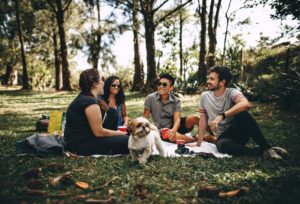How to tell a story: 4 useful expressions!

When was the last time you told a story in English? Telling stories is a great way to participate in a conversation. So, in this lesson we’re going to teach you 4 really useful expressions so you can tell better stories! First, you’re going to listen to a conversation with Josh and Casey. Josh is telling Casey a scary story.
Then, we’ll teach you the 4 expressions. Finally, you can do an exercise to see how much you can remember. OK?
Good luck!
[see below for the video script]
- First, you’re going to watch a conversation with Josh and Casey. And Josh is telling Casey about a scary experience he had. So, first I want you to watch the conversation.
- Then I’m going to show you four expressions that are really useful.
- Finally, you can go to our blog to try a little exercise to see how much you can remember.
OK? Let’s go!
So, remember: When you watch a conversation on one of our videos, the best thing is to watch it from start to finish without stopping, and try to understand as much as you can. This is called listening for gist, and it’s important that you make the effort to try to understand as much as you can, OK? And as you’re doing that, I want you to answer one simple question:
What was making the noise that frightened Josh?
What was making the noise that frightened Josh so much? OK?
Bye!
Expressions
Expressions

OK, did you hear the answer? It was a tree that was making the noise that frightened Josh so much. Did you get it? I’m sure you did.
OK, now we’re going to learn the four expressions. As I say them, try repeating them after me. This is very good practice for two reasons. Firstly, as you repeat them, you’re remembering them, you’re making an effort to memorize them. Secondly, it’s very good for your pronunciation. OK?
1. To end up
“I ended up staying a little longer,” Josh said. If you “end up” doing something, you do that thing in the end. For example, “At university, I started studying biology, but I ended up studying history,” which means I studied history in the end.
2. To go on
“I wanted to see what was going on,” Josh said. The things that are “going on” are the things that are happening. For example, if you hear a noise upstairs, you could go up there and say, “What’s going on? What’s happening?” It’s a very useful phrase or verb.
3. To get
Josh said, “I got an umbrella to defend myself.”
If you “get” something, you take it. This is one of the many meanings of this very common verb, to get. For example, “I got the keys from the table.” It means more or less, I took the keys from the table.
4. To find out
“I found out it was a tree.”
If you “find out” information, you discover it, or understand it. For example, “I thought she was French, but I found out that she’s actually Italian.” So, to find out means to discover, or to learn, or understand, OK? So there are the four really useful expressions that you can use when you’re telling a story, OK?
Exercises. Language quiz!
Try our little language quiz to see how much you can remember. [answers below]
Complete the sentences with the correct words.
- I went upstairs to see what was going _______.
- Police never found _______ who the murderer was.
- I ended _______ studying French at university after starting another subject.
- Did you ever find _______ who stole your favourite pencil?
- After the film, we ended _______ at Pete’s house.
- I _______ my keys from the table, then left the house.
- What was all that noise? What was _______ on?
- Did you _______ the money I left for you on the table?
Answers: 1. on; 2. out; 3. up; 4. out; 5. up; 6. got; 7. going; 8. get
Video script
A = Annie J = Josh
A: So, what did you get up to last night?
J: Last night I went to the cinema with some friends, ended up staying a little later than I
should have… of course, they’re crazy people. And then I came home and I had a bit of
this, a bit of a fright. What happened was, I came in the house, and started hearing all
these strange noises like rattling and banging and hitting from what I thought was
upstairs. So, the neighbours are sometimes noisy, so I thought maybe it’s them, but the
noise continued so I went up to knock on the door to see what’s going on, the
neighbours weren’t there, came back down and it continued, so I thought that maybe
there’s someone in the building or in my house…
A: Oh, my god.
J: I got an umbrella, to defend myself, like back off.
A: Really?
J: Yeah, I was scared.
J: Yeah, I was scared.
A: OK, it’s the closest thing you have.
J: Yeah, it’s gonna do some damage. And then, I went in the kitchen to look, and there
was the problem, it was just a tree, blowing in the wind in on the window.
A: And you got your umbrella for it.
J: And I was there with my umbrella like an idiot and it was just a tree.
A: I probably would have done the same thing – freaked out.
J: What can you do?
A: My God. So, you must have slept like a baby after you found out it was just a tree.
J: Yeah, exactly. With my umbrella.
A: Yeah! What a scare though, oh my God!
J: Yeah, it was alright though.
Комментариев нет:
Отправить комментарий